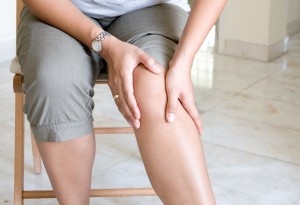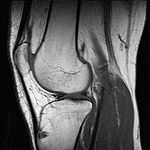Knee Pain
Knee pain is an extremely common injury, especially in sport. Knee pain can be caused by a whole variety of factors – awkward movements, falls and collisions, sudden twists, excessive force or overuse. Common knee injuries include ligament, tendon and cartilage tears, and biomechanical patellofemoral pain syndrome.

Sport & Spinal Physiotherapy has helped many clients from Gungahlin and the wider Canberra community with all types of knee pain syndromes.
Patellofemoral Pain Syndrome
This refers to pain in or around the kneecap. Anterior knee pain is typically increased during activities involving squatting, going up or down stairs, kneeling or running. The pain is usually caused by an imbalance of the muscle forces around the patella. Common sources of patellofemoral pain include: chondromalacia patellae, patella fat pad impingement, patella tendinitis, lateral patella compression syndrome, patella bursitis and quadriceps tendinitis. In nearly all cases physiotherapy and taping provides an effective solution to anterior knee pain. Podiatry may also help reduce patellofemoral symptoms with prescription custom moulded orthotics to improve gait and lower limb alignment.
Ligament Injury
Anterior Cruciate Ligament: The anterior cruciate ligament (ACL) is located inside the knee joint capsule and is commonly injured when the athlete rapidly decelerates, followed by a sharp or sudden change in direction (cutting). ACL injury is often seen in all football codes, skiing, basketball, netball and any other sport involving change in direction running.

Posterior Cruciate Ligament: The posterior cruciate ligament (PCL) and is commonly injured by a direct blows to the flexed knee, such as the knee hitting the dashboard in a car accident or falling hard on the knee in sport, both instances displacing the tibia posterior to the femur.
Medial Collateral Ligament: The medial ligament (MCL) is likely to be injured when the knee is impacted from the outside. Serious injuries to this ligament also frequently happens when the ACL is injured.
If any ligament injury is serious enough, the knee may feel unstable or wobbly, although this symptom can be caused by the presence of swelling or pain inhibiting the surrounding muscles. Braces or taping can help restore stability in the early stages of rehabilitation.
If the ligament tear is minor, physiotherapy alone can help restore full function. However, if the ligament injury is serious then surgery may be required. Either way, our physios can determine the best course of action for your knee ligament injury.
Meniscus Injuries
The meniscus are cartilage pads that sit between the knee bones to stabilise the joint, control movement and absorb shock. The meniscus can be damaged from twisting or turning during weight bearing loading activities. Some meniscus tears can stabilise and heal with physio while others require surgery.
ITB Friction Syndrome
Iliotibial band friction syndrome is a common cause of lateral knee pain often associated with running, cycling and hiking. The problem arises from continual rubbing of the band over the lateral part of the femur bone.
Muscle Injuries
Muscular strains and tears can occur at any time but particularly when the muscles are cold. Contusions (corks) occur when a large sudden impact is made with the muscle. Hamstring, groin and thigh strains are most common in sport. When a muscle is injured you are likely to feel a sharp burning pain and if serious enough, a sensation of numbness or weakness.
Arthritis – Osteoarthritis
Osteoarthritis refers to articular cartilage joint surface breakdown. This may be quite minor at first with little symptoms, but if the degeneration continues the knee joint will become more painful with swelling, loss of function, weakness and joint stiffness. The major causes of osteoarthritis are obesity and previous injury. Mild knee osteoarthritis symptoms can be eased with physiotherapy, orthotics and hydrotherapy. For more severe osteoarthritis, a total knee replacement may be warranted. We can work with your surgeon to make sure you make a complete recovery from any knee replacement. A guided exercise programme can help both pre and post-replacement to ensure a speedy recovery.
Growing Pains
Osgood–Schlatters disease is a traction injury of the patella tendon pulling on the growth plate at the bony prominence just below the patella. Sinding–Larsen–Johansson syndrome is a similar condition again involving the patella tendon but pulling at the growth plate at the lower margin of the patella. Both these growing pain disorders occur in active boys and girls coinciding with periods of growth spurts.
How can Sport & Spinal Physiotherapy help your knee injury?
In most cases, physiotherapy alone offers an effective solution for most knee injuries. During your first visit, we will examine your knee to determine what structures have been damaged. Establishing the correct diagnosis early is imperative as several injuries mimic symptoms yet have different treatment protocols. We use our unique ‘phase-based rehab system’ to ensure all aspects of a full and lasting recovery are delivered. We will tailor a treatment plan to suit your needs, with you involved in the decision making to make certain that we address your biggest concerns. Our physios will use hands on therapy techniques to improve joint mobility and muscle flexibility. We will nearly always at each session provide home exercises of stretches and strength work so that you keep improving between sessions. Early treatment will be focused on reducing pain and swelling and regaining range of motion. The physiotherapist will then prescribe an exercise program to improve the strength and coordination of your knee, which are important for preventing re-injury. Massage, hydrotherapy, dry needling and our gym may also be used for best outcome. Towards the end of the treatment program you will be given prevention strategies to keep the pain away. The sooner we begin your knee rehabilitation, the faster your recovery and back to the things you love doing.
Our physios may also refer you to one of our podiatrists to correct lower limb alignment with custom moulded orthotics to help your knee pain.
Some ligament ruptures and meniscus tears may require surgery and we may recommend an MRI to confirm the diagnosis. Based upon the MRI findings we may recommend referral to a medical specialist to determine if surgery is appropriate.
Why choose us for your knee pain?
- We listen, we care and we get results
- We have physiotherapy and podiatry for even the most complex knee injuries
- We provide physiotherapy to fix the cause of your knee injury and not just the symptoms
- Our podiatrists can prescribe custom moulded orthotics to help your knee pain
- We can provide a running assessment if your knee pain is related to running
- We provide bike fitting if your knee pain is cycling-related
- We have therapists who have special training in sporting knee injuries having completed further studies
- We have extensive experience in dealing with lower limb injuries
- We can refer you for further investigations such as x-ray or MRI if required
- Our therapists are passionate about sport and engage in an active lifestlye
- We understand the demands and technique involved in all sport types
- Our therapists have been recognised for their expertise having been national sporting team consultants
- We provide braces or taping to protect your knee on return to activity
- We have practitioner only fish oil and glucosamine supplements for osteoarthritis sufferers
- Our physios and podiatrists can recommend the ideal footwear to suit your foot type
- We have advanced gym equipment to improve knee strength and coordination
- Our massage therapists can sort out any tight muscles
- Our hydrotherapy sessions can be very effective for early rehabilitation of ankle injuries
- We can provide dry needling for pain management and accelerated healing
- We can supply practitioner only natural anti-inflammatory supplements to help healing
- Many of our physios work with local, state, national and international teams and athletes
- We give you cross training activities so you can maintain your fitness whilst injured
- We provide you with the tools to look after your health long after you leave our care
- We provide you with a guided return to sport with any technique modifications or training restrictions
- We can recommend referral to a medical specialist if need be to see if your knee injury requires surgery